Welcome to DU!
The truly grassroots left-of-center political community where regular people, not algorithms, drive the discussions and set the standards.
Join the community:
Create a free account
Support DU (and get rid of ads!):
Become a Star Member
Latest Breaking News
Editorials & Other Articles
General Discussion
The DU Lounge
All Forums
Issue Forums
Culture Forums
Alliance Forums
Region Forums
Support Forums
Help & Search
Atheists & Agnostics
Related: About this forumReligion In The Comics - 033
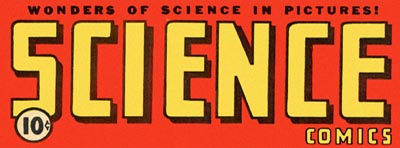
This week, RITC once again journeys into the world of Science as we look at the life of Alfred Nobel. This Biography comes from the pages of Science Comics #3, cover dated May 1946. Printed by Humor Publications.
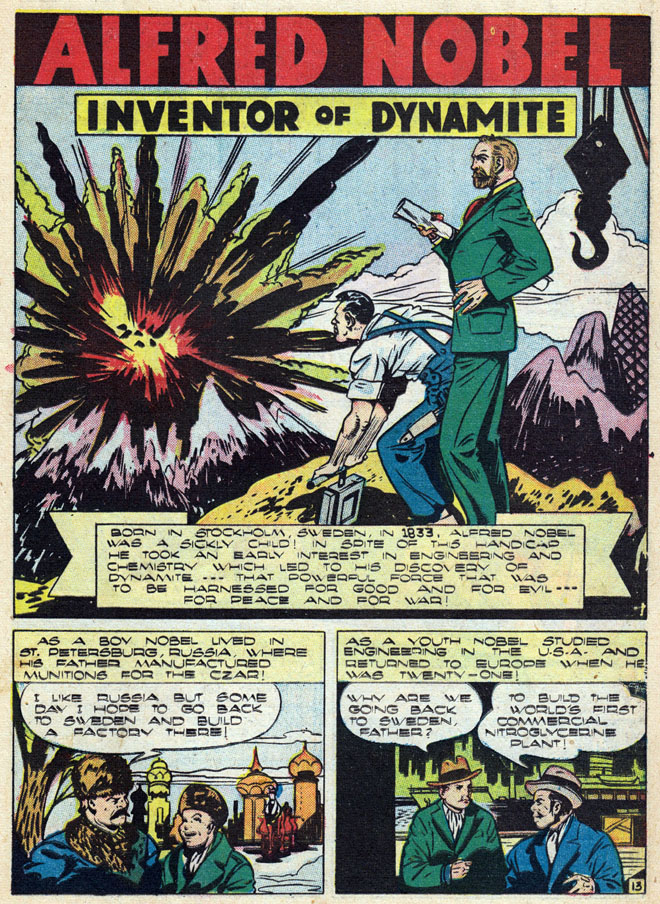

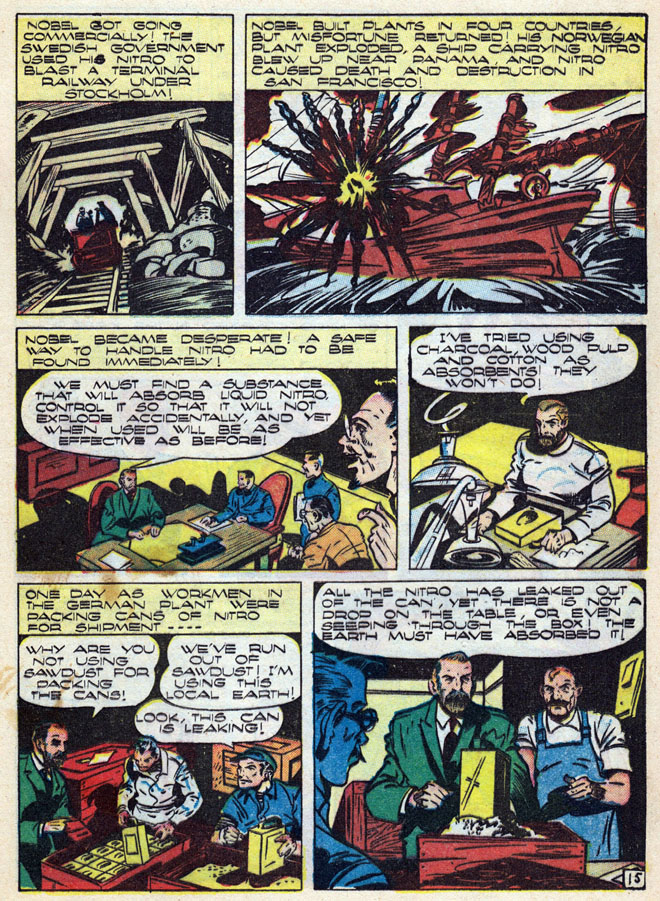
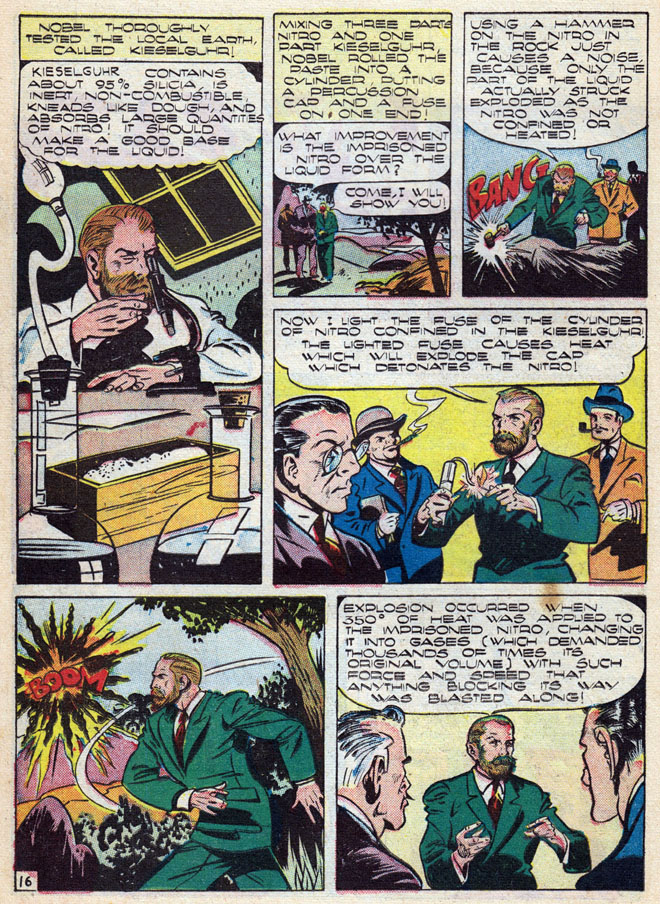
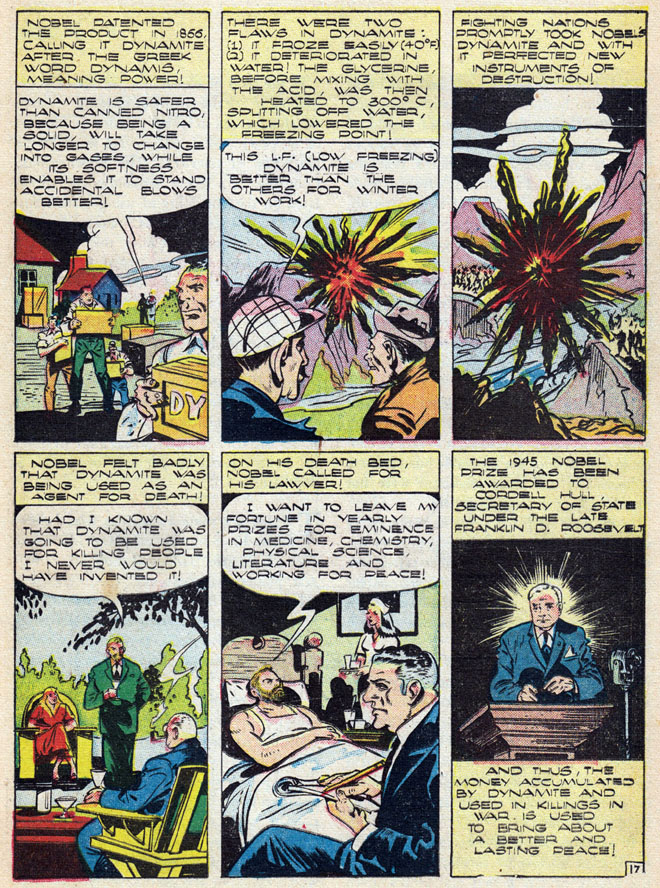
I like how in his death bed he doesn't call for a priest in a selfish effort to save his soul. Instead, he calls for his lawyer to make a will that will benefit mankind. Who says atheists aren't capable of doing good? Who says people need God in order to do good deeds?
Was Alfred an atheist? Here is something another biographer laid down on an official site.
http://www.nobelprize.org/alfred_nobel/biographical/articles/frangsmyr/
I would like to touch upon another level of Alfred Nobel's personality, that of the humanist and philosopher. We know that he had literary interests and ambitions. He was an avid reader of fiction and wrote his own dramatic works and poems. In addition, he was attracted to philosophical issues. He read certain philosophical works with such interest that he underlined important passages. Among the papers that he left behind is a black notebook on philosophy that his biographers have not taken an interest in. Although not constituting profound original thoughts, these penciled notes reflect his serious interest in philosophical questions. Nobel went through philosophy from antiquity to modern times, pointing out what he perceived to be vital issues. He made his own comments, which in a morose way showed his detachment from the subject. He commented on Plato, Aristotle and Democritus, but also on Newton and Voltaire as well as contemporary biologists such as Darwin and Haeckel. Nobel noted, for example, that it was unclear what caused people to form a conception of a God: "Aristotle attributes it to fear, Voltaire to the desire of the more clever to deceive the stupid." He spoke with respect of the philosophical doubts of Descartes and Spinoza, adding that doubt must surely be the starting point for all philosophical thinking. Theories of knowledge were of special interest to Nobel. Consequently, he returned several times to Locke's thesis that all knowledge arises from sensory impressions, declaring that the "brain is a very unreliable recorder of impressions."
This led him to reflect further on the methodology of science and to develop a line of reasoning that, aside from being inspired by Locke's thesis, also seemed to have been influenced by Alexander von Humboldt's theory of knowledge. Nobel wrote that all science is built on observations of similarities and differences. He continued:
"A chemical analysis is of course nothing other than this, and even mathematics has no other foundation. History is a picture of past similarities and differences; geography shows the differences in the earth's surface; geology, similarities and differences in the earth's formation, from which we deduce the course of its transformations. Astronomy is the study of similarities and differences between celestial bodies; physics, a study of similarities and differences that arise from the attraction and motive functions of matter. The only exception to this rule is religious doctrine, but even this rests on the similar gullibility of most people. Even metaphysics - if it is not too insane - must find support for its hypotheses in some kind of analogy. One can state, without exaggeration, that the observation of and the search for similarities and differences are the basis of all human knowledge."

InfoView thread info, including edit history
TrashPut this thread in your Trash Can (My DU » Trash Can)
BookmarkAdd this thread to your Bookmarks (My DU » Bookmarks)
1 replies, 3109 views
ShareGet links to this post and/or share on social media
AlertAlert this post for a rule violation
PowersThere are no powers you can use on this post
EditCannot edit other people's posts
ReplyReply to this post
EditCannot edit other people's posts
Rec (6)
ReplyReply to this post
1 replies
 = new reply since forum marked as read
Highlight:
NoneDon't highlight anything
5 newestHighlight 5 most recent replies
= new reply since forum marked as read
Highlight:
NoneDon't highlight anything
5 newestHighlight 5 most recent replies
Religion In The Comics - 033 (Original Post)
Cartoonist
Jul 2015
OP
RussBLib
(9,666 posts)1. Alfred was an atheist
according to Celebrity Atheist and several other sites.
Whoever might have said atheists aren't capable of doing good or need God in order to do good deeds is simply a very uneducated person. A willfully uneducated person.
That was a very informative strip. Seems like a good way to popularize science.